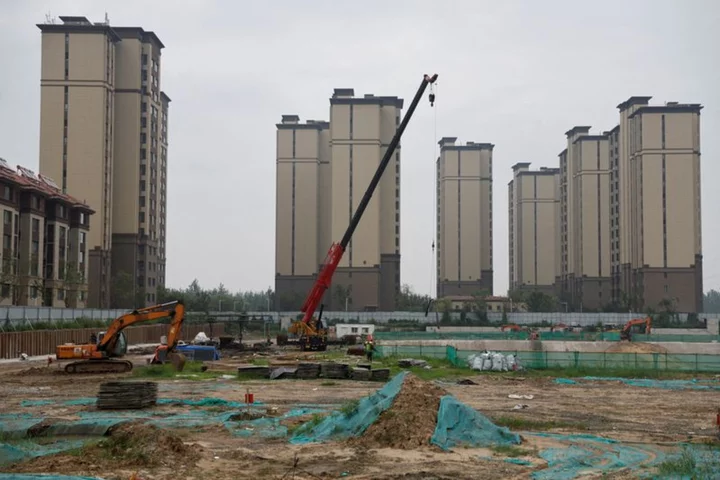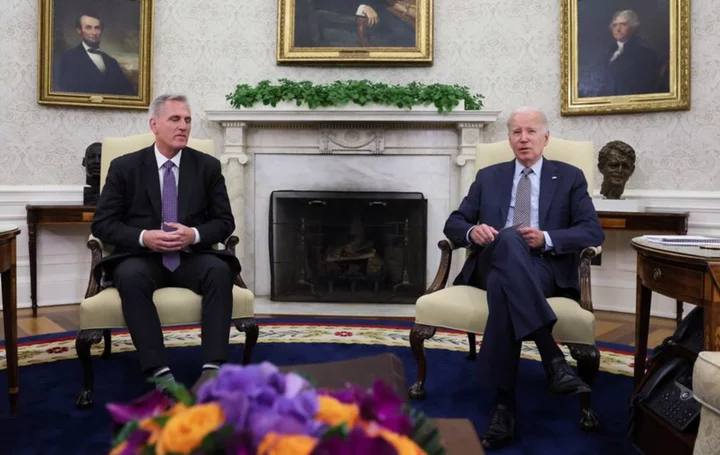By Xie Yu and Shuyan Wang
HONG KONG/BEIJING (Reuters) -Country Garden made interest payments on U.S. dollar bonds hours ahead of a grace period deadline, a person close to the firm said, pulling from the brink of default for the second time in four days and bringing relief to a crisis-hit property sector.
China's largest private property developer failed to pay coupons on the bonds totalling $22.5 million due on Aug. 6, exacerbating fear of its cash situation and keeping markets on tenterhooks throughout the bonds' 30-day grace periods.
Though the amount was relatively modest, failure to pay would have undermined fragile hope in financial markets that China's steady drip feed of policy stimulus was starting to stabilise the economy and its struggling property market.
It would also have raised the prospect of default on other dollar bonds as well as creditor calls to accelerate payments, bondholders and lawyers said, while heightening concern of spillover risk in the world's second-largest economy.
Country Garden on Tuesday also offered to extend repayment of eight onshore bonds worth 10.8 billion yuan ($1.48 billion) by three years, according to people with knowledge of the matter and documents seen by Reuters.
Those bonds, issued by Country Garden and a subsidiary, were set to mature and be puttable in 2023 and 2024, showed the documents sent to onshore bondholders.
Country Garden did not respond to a request for comment.
The people familiar with the matter declined to be identified as they were not authorised to speak with media.
"Country Garden is trying hard to fulfil debt obligations but whether this can continue will depend on the effectiveness of this round of stimulus and regulatory relaxation," said Gary Ng, Natixis Asia Pacific senior economist.
Latest government stimulus measures over the last few days included lowering existing mortgage rates and preferential loans for first-home purchases in big cities.
Ng said the latest stimulus should help stabilise the home market and consumer confidence, allowing developers to deleverage less painfully, though more is needed to reverse a decline in income growth in a slowing economy.
STUTTERING ECONOMY
Country Garden's cash squeeze highlights the fragile state of China's real estate sector, which accounts for roughly a quarter of the economy and whose situation has deteriorated since a government campaign against high leverage began in 2021.
Making matters worse is a lacklustre post-pandemic economic recovery.
Services activity expanded at its slowest pace in eight months in August, a private-sector survey showed on Tuesday, as weak demand continued to dog the economy and stimulus measures failed to meaningfully revive consumption.
"With domestic demand weak and house prices on the slide in smaller Chinese cities in particular, there are still worries about the fragility of the real estate sector," said Susannah Streeter, head of money and markets at Hargreaves Lansdown, U.K.
"Stimulus efforts to increase mortgage lending are welcome but a much larger package of support is likely to be needed to restore more confidence in the sector, and put exposed property firms on a firmer footing."
MATURITY EXTENSION
Some of Country Garden's dollar bonds added 2 points to their prices after news of Tuesday's payments - a sign the bonds were trading with accrued interest, or with expectations that coupons will be paid, traders said.
Prices were, however, still at distressed levels, ranging from 11 to 15 cents against the dollar.
Country Garden's share price was down about 1%, paring some of its losses from earlier in the day. The Hang Seng Mainland Properties Index and China's CSI 300 Real Estate Index lost more than 2% each.
The interest payments for offshore bonds came after Country Garden on Friday won approval from onshore creditors to extend the maturity of a private bond worth 3.9 billion yuan ($536 million).
Country Garden has not missed a debt payment obligation, onshore or offshore. However, it flagged the risk of default should its financial performance continue to deteriorate after posting a record loss for the first half of the year.
The developer has about $162 million of offshore bond interest payments due during the rest of the year, showed data from researcher CreditSights.
(Reporting by Xie Yu in Hong Kong, Jason Xue in Shanghai and Siddarth S. in Bengaluru; Writing by Sumeet Chatterjee; Editing by Christopher Cushing)









